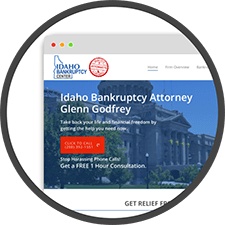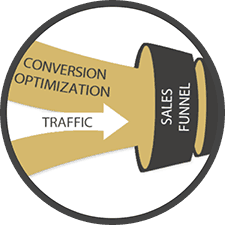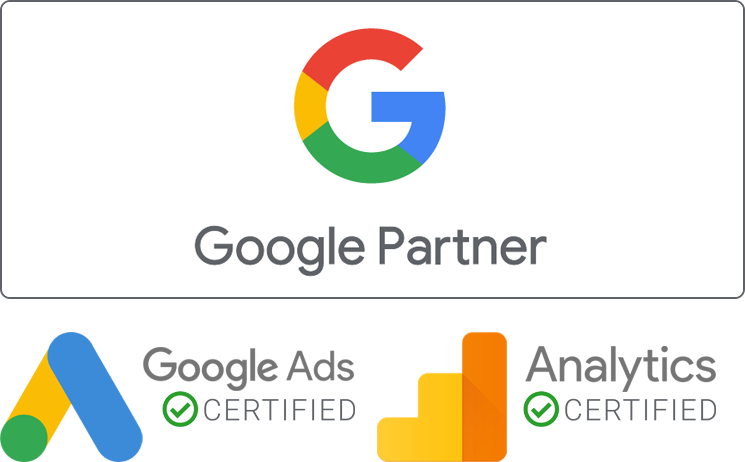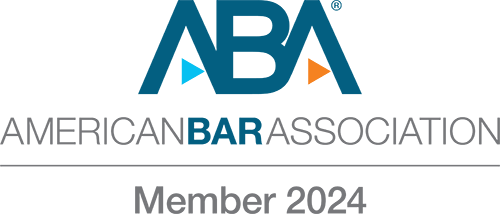How Attorneys Can Win Online, Dominate Their Practice Area, and Own Their Market.
MORE VISIBILITY ON GOOGLE | CONVERT MORE LEADS TO CLIENTS | TRACK RESULTS
Digital Marketing for Attorneys and Law Firms
Start Growing Your Legal Practice with a Proven Digital Marketing Strategy that Works.
Online marketing for your legal practice does not need to be complicated or overly expensive, and when done correctly it should bring in new clients and leave you with a substantial return on your investment.
A well-thought out and properly executed digital marketing strategy can attract more of the clients you want on autopilot, freeing you from the concern of where your next client will come from. It can empower you to be more selective with the clients you choose to work with and to charge more for your services.
The biggest mistake we see is that most attorneys do not have a comprehensive and cohesive strategy when attempting to market their legal practice online. They get lost in the sea of buzz words and acronyms (SEO, PPC, CRO) and quickly give up trying to figure it out, or decide that internet marketing for lawyers simply doesn’t work.
This guide along with this video presents an overview of what we’ve found works extremely well for generating leads and new clients for lawyers and law firms online.
It contains actionable information that you can put into place immediately to start getting more of the clients you want for your legal practice.
We cover our “four pillars” that (when executed correctly) have proven to be a very successful way of generating leads and getting new clients in the door for attorneys and law firms at a substantial ROI.
Pillar 1:
Demonstrate Expertise with Your Brand, Content Strategy & Message
Start by Creating a Solid Brand
At its core, your brand should position you as an expert and not just a service provider. Experts can always charge more, they will stand out, and they will convert prospects into paying clients at a higher rate.
As you’re developing a marketing strategy for your law firm, having a clear definition of your brand is important. Your brand needs to be central to all of your marketing in order to maximize the effectiveness of your efforts.
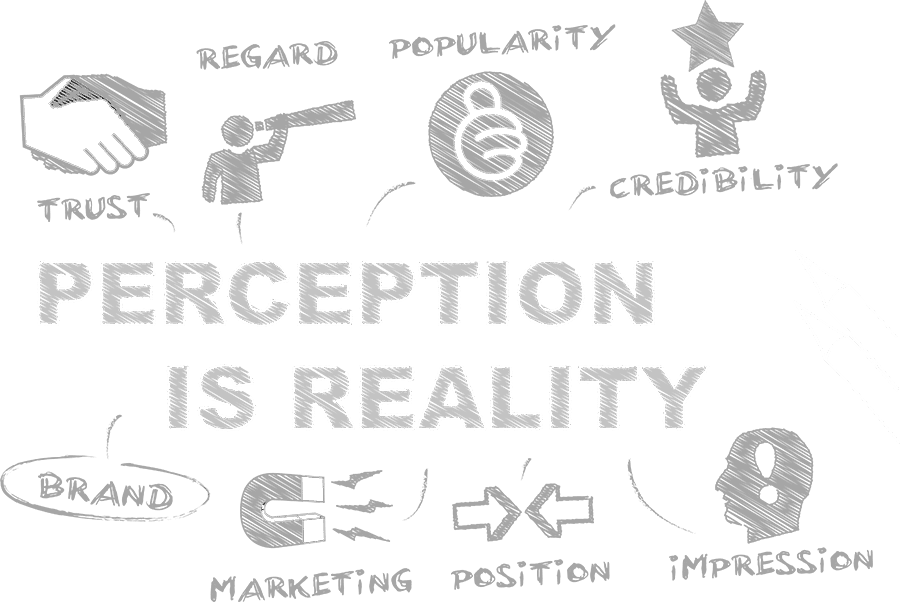
What is a Brand?
A brand is an identity. It’s the image you project to your clients and prospects. It says who you are, what you do, what you stand for and what clients can always expect from working with you.
Your prospective clients need to feel confident about working with you. Feeling confident can mean a number of things for prospects. They want to know that you can help them solve their legal problems, that you can do it for a fair price, and that you have expertise in your practice area.
You’ll notice that these feelings are primarily rooted in trust, reputation and authority, all of which can be built into your brand and expressed in your marketing endeavors.
Begin with Your Logo
A logo is an important step in branding and marketing your law firm. A good logo can drive conversion rates up, while a bad one can drive them down. The font, images and colors in your logo should be designed to resonate with your prospective clients.
It should look sharp and professional. We have found it to be a plus for logos to visually represent the type of legal services you provide and or the place you practice. This helps to set you apart from the myriad of “national” directories and lead generation companies. It should convey to prospects immediately that you are the local expert, capable of solving their legal problem(s).
When choosing colors, consider the emotions evoked behind your choice. Colors are psychologically associated with different emotions. You can refer to this post to see a color wheel and get some ideas for your logo.
Your website colors and design can then be designed around your logo so that everything matches nicely.
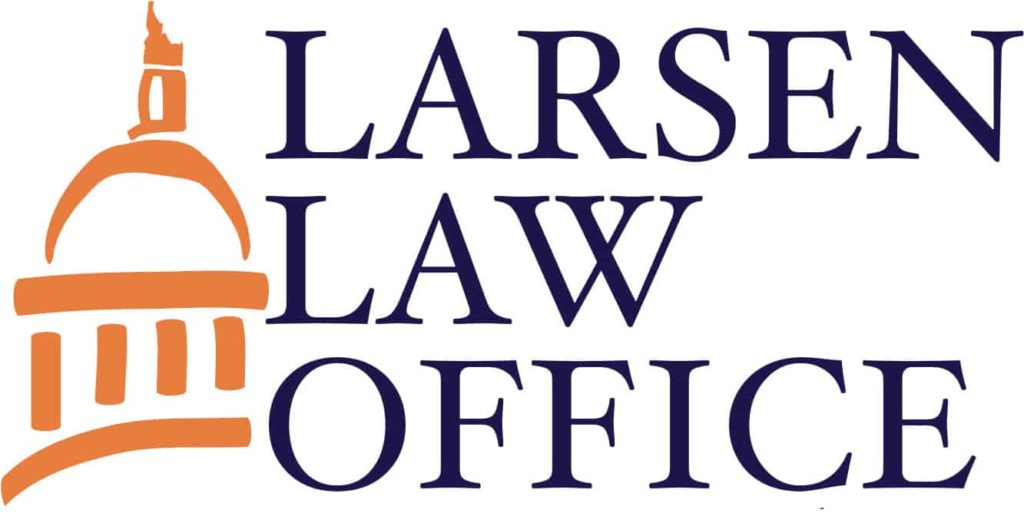


Once you have your logo, you can then move onto demonstrating credibility and authority. This can be accomplished in two ways. The first is through online reviews and the second is through the content on your website.
Online Reviews and Reputation Management
Online reviews have become essential to any law firm’s brand and marketing efforts. A legal marketing survey we conducted last year revealed that 80% of people said they would seek out and take into consideration an attorney’s online reviews before hiring them.
Online Reviews Help Increase Search Engine Rankings
Online reviews can help to get your website and your local Google “Maps” listing ranked higher. This is because citations and reviews are major pieces of how Google’s algorithm ranks your website locally.
The more reviews you have across a variety of platforms like Google, Yelp, and Facebook, the more quality signals you’ll send back to Google, as well as to your potential clients.
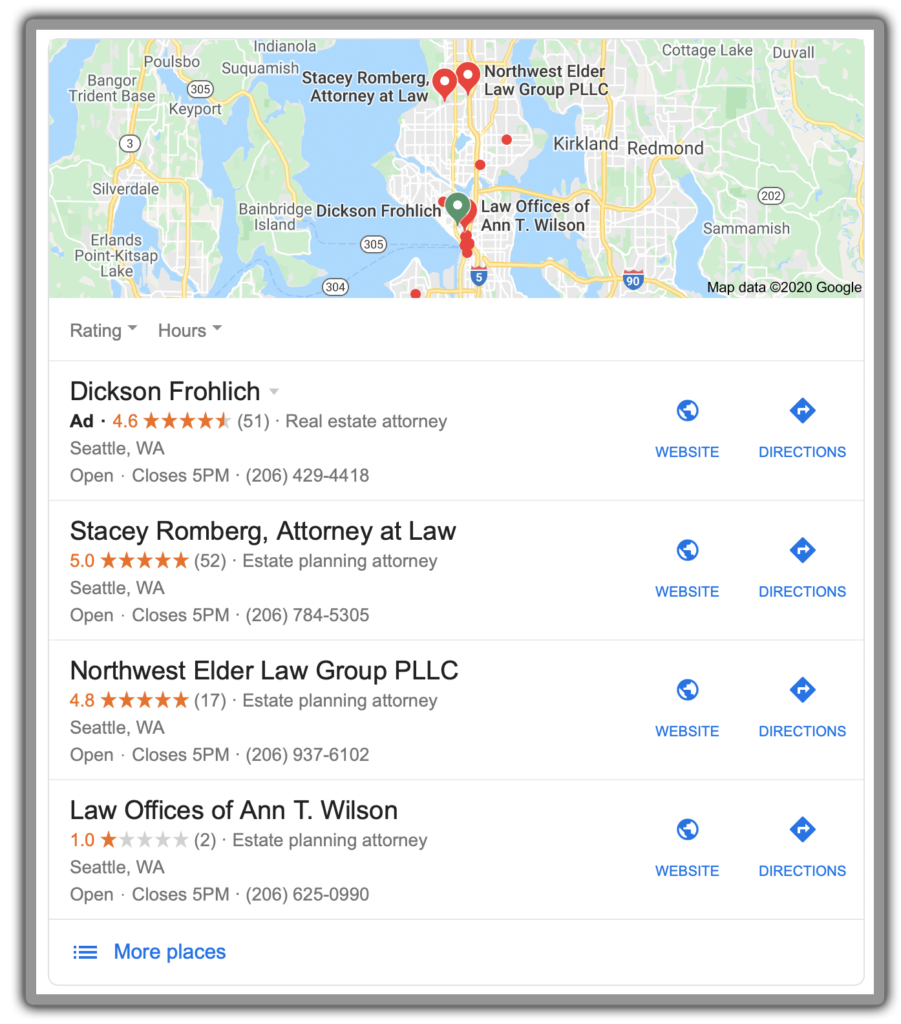
Positive Reviews Increase Conversion Rates
The second reason that online reviews are important is that they help convert more prospects into paying clients. Beyond search ranking factors, reviews serve as social proof to your prospects that your firm will provide them with great service.
Many lawyers say that word-of-mouth referrals are a central part of their marketing strategy. However, data suggests that more people leave online reviews than give reviews or referrals in person. Additionally, far more people say they trust online reviews (almost 85%) than those who do not.
Conversely, bad online reviews can have a very negative impact on your marketing efforts. The Harvard Business Review found that a 1-star difference in ratings resulted in a 5-9% change in conversions.
How Lawyers and Law Firms Can Get More Online Reviews
If you want to generate more online reviews, asking for reviews in the first place is key. Simply sending an email or asking in person is the first step. You can do this very easily by creating a Google review link and sending it to clients directly. Another effective way to build your online reviews is to use a tool like BirdEye or GatherUp which help automate the process of requesting reviews.
The second way to demonstrate credibility and authority is through the content you publish on your website which we cover in the next section.
Supporting Your Brand with Compelling, Useful and Quality Content
The best way to position yourself as an expert is through the creation of quality content which helps prospective clients solve problems and answer questions while highlighting your experience and expertise. It should make clear to prospects what sets you apart from other law firms, and why they should do business with you.
Google’s algorithm has been refined to both reward websites with quality, useful content and to devalue the ones that have none. It’s never been more important to create good quality content for your website than it is now.
This is why you should take the time to create an overall content strategy in order to achieve long-lasting effective SEO for your law firm and conversion optimization results. We work with our clients to create customized and compelling content to attract new leads and convert them into paying clients.

Your content should be robust, well-written, accurate and most importantly, useful to your potential clients. There is no minimum or maximum ideal length; it just needs to be long enough to serve its purpose. Sometimes that may mean just a few hundred words, and other times, that may mean several thousand words.
Elements of Good Website Content
Knowing Your Audience – We see a lot of attorneys and law firms describing what they are selling. This makes for very boring and repetitive content. Instead, we suggest you start with your ideal client. What problems are they looking to solve, what questions might they have? What’s going on in their lives? How can you help? Think about what information would be most helpful to them.
Solving your ideal client’s legal problems should be central to all of the content on your website.
Keyword Identification and Targeting –The first step in content creation is to make a list of topics to create content for. Think about your conversations with prospective clients when they first call you. What word choices do they use when they discuss their potential case or issue? Take notes of these word choices, most likely this is what they, and many others, would type in a keyword phrase search.
You can then use free tools like Ahrefs Keyword Generator to find keywords and content that your prospective clients are searching for. You can also start typing something into Google, and you will see suggested search results. This usually is a good indicator of what your prospective clients are searching for. You can also scroll down to the bottom of Google’s search results where you will see “searches related to” with more ideas you can use.
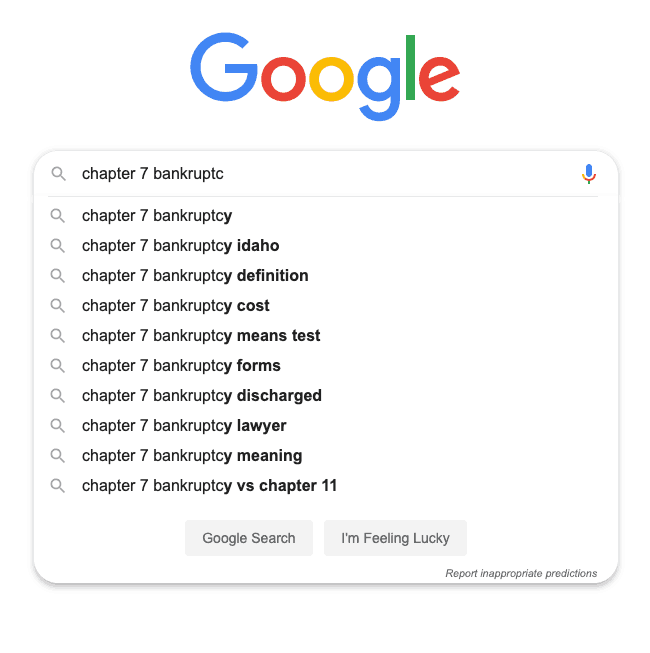
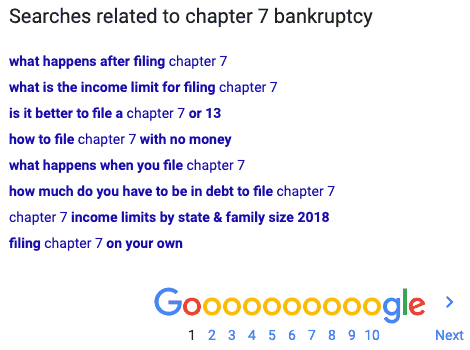
Unique Value (Selling) Proposition – You should spend some time considering the benefit of your services, how you solve your client’s problems, and what distinguishes you from the lawyer down the street. You should communicate the value of your services quickly and in a way that is obvious to your potential clients.
Types of Content
Website Pages
Your website pages should be used to introduce your firm, describe services, and answer common questions. Your pages should be used to build credibility and authority around your firm. It’s important to use these pages to communicate the full extent of who you are, what services you provide, and your capability to deliver results for your potential client.
You want to be very clear about the extent of your legal services, as well as the geographic area you serve. There should be no doubt left in a prospects mind about what the services you provide are, and how you can help.

Blog Posts
Your blog exists for two reasons. First, to show prospective clients that you’re a knowledgeable, trustworthy professional and second to get people to find your post, come to your site, and eventually contact and hire you. Your blog posts should be centered around keywords and topics your prospective clients are searching for (see “keyword identification and targeting” above). If you do this, and create quality blog posts, you really only need to blog once a month to get big benefits from it.

Images
The images on your website should look professional and be used to support the content you’ve written. They should be a visual representation of your content so that main points and key ideas are highlighted and illustrated. Images are a great way to subtly and subliminally convey that you are a local expert.
You can find images to use for your website pages and blog posts from sites like Adobe Stock and Pexels. It’s important to use at least some of your own custom images as well. Cell phone cameras are now fully capable of taking a high-quality picture that can be used on your website. You can also hire a local photographer to make your website images more personal. People respond to local and personalized images far more than stock images, so it’s best to use stock images sparingly.

Videos
In 2024, it’s more important than ever to get going with video marketing for your law firm. Current data shows that you are up to 10x more likely to be featured on the first page of Google if you include video content on your website. It’s an increasingly popular way for consumers to gather information from the internet. Videos can also help you build trust with your potential clients which will improve your conversion rates.

Videos can be used to introduce yourself and attorneys in your law firm, along with featuring client reviews and testimonials. Video reviews and testimonials are one of the most powerful ways to increase your conversion rates. Seattle estate planning attorney Stacey Romberg’s website is a good example of how law firms can showcase videos on their website.
Pillar 2:
Showcase Your Law Firm’s Brand and Content with Your Website
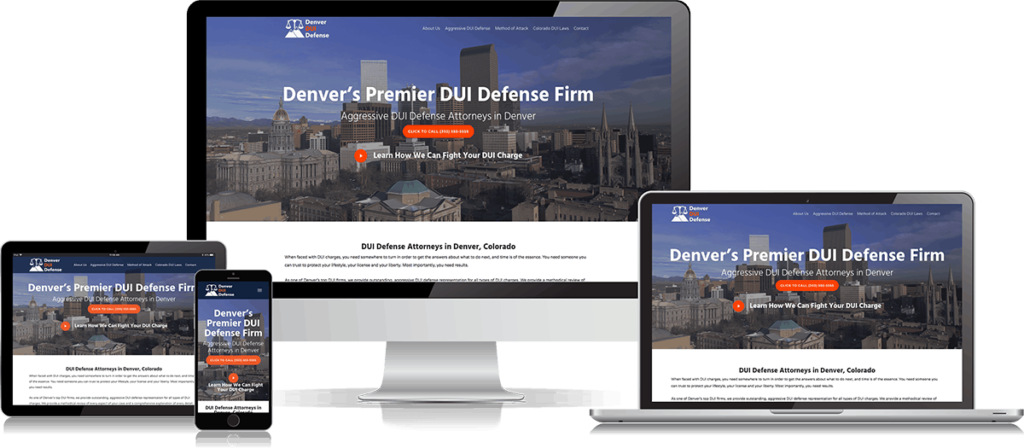
Your law firm’s website should be the central piece of your digital marketing efforts. From a prospective client’s perspective, your website is your law firm. It’s often their first, most lasting impression of who you are, what sets you apart and how well you can meet their legal needs.
It is important to consider how effective your website will be in getting people to want to hire you for their legal needs. You can drive all the traffic in the world to your website, but if the website lacks fundamental elements, you’ll likely convert little to none of that traffic and have very little to show for it at the end of the day.
This is one of the reasons many lawyers and law firms believe that SEO and PPC marketing doesn’t work. If you’re sending good traffic to a bad website, it won’t convert (and those clicks can be expensive!) For these reasons, it’s imperative that your law firm’s website be built to convert prospects into paying clients before you spend any money on getting website traffic.
Elements of a Good Law Firm Website
The design of your website is critical to communicating the right message to your prospective clients. A clean, simple to use site with a strong, unique personality can instantly set you apart and help increase conversions.
Many lawyers struggle to articulate what services they provide in terms that their prospective clients can easily and quickly understand. When designing your site, always put yourself in your ideal client’s shoes. Your website should be able to communicate the value of your legal services in a matter of seconds and your message should be crystal clear, enticing and memorable.

A good law firm website conveys what makes you unique and helps you stand apart from your competition.
On the Internet, trying to be all things to all people is a great way to reach no one. Effective design zeroes in on the attributes that set you apart and communicates that unique identity through images, videos, words, and how your website is organized.
Always think in terms of your prospect’s expectations. If you’re a DUI or criminal defense attorney, being “aggressive” (think power colors like red) can help reinforce your message to a prospect. On the other hand, if you’re a family law attorney taking a “softer” approach would likely resonate more with a prospective client.
Minimize Practice Areas
People tend to seek out a “specialist” when looking to solve a legal problem and Google knows this. When a website is completely branded for a specific practice area and all of the content matches that practice area it does two things.
First, it can give you an advantage in search engine rankings compared to other attorney websites with multiple practice areas. Second, it can give you an advantage in the mind of a potential client because you appear to be an “expert” or “specialist” without having to say so.

Feature Testimonials
Displaying testimonial videos and embedding online reviews from sources like Google and Facebook are a great way to increase conversion rates. You can use tools like EmbedSocial and YouTube to do this easily.

Display Badges and Awards
If you have awards, recognitions or any other badges that can bolster your credibility and expertise, add them to your website. Websites like Avvo offer opportunities to get impressive third-party logos to improve your website’s conversion rate.

A good law firm website answers a prospective client’s questions.
Make it simple for prospective clients to know that you are the answer to their legal problem(s). A well-designed website clearly communicates this upfront by answering questions they have before ever speaking with you.
You can do this by answering frequently asked questions that you hear when speaking with prospects and current clients alike. Include these questions and answers throughout your website, in headlines, FAQ pages, and anywhere they fit naturally.

A good law firm website has personality.
Don’t just be another “stock/template” website. Keep in mind that while you’re selling legal services, you’re also selling yourself. Don’t be afraid to add personal touches such as your photo to your website.
Also keep in mind that people are looking for a local expert. Avoid using too many stock photos. Choose images that reflect your personality, practice area(s) and geographic area you serve. Then, reinforce those messages in headlines and other prominent blocks of ad copy.
A good law firm website is easy to use.
Your website should be mobile optimized with easy to read content on all devices. Fancy features such as Flash video and graphics, sliders or other memory-consuming content can actually make the user experience worse. Expensive features like this rarely increase conversion rates. Keep your website straightforward and easy to use.
Make sure that mobile versions of your website include features like “click to call” buttons and very simple contact forms. It should be easy for people to know how to contact you.
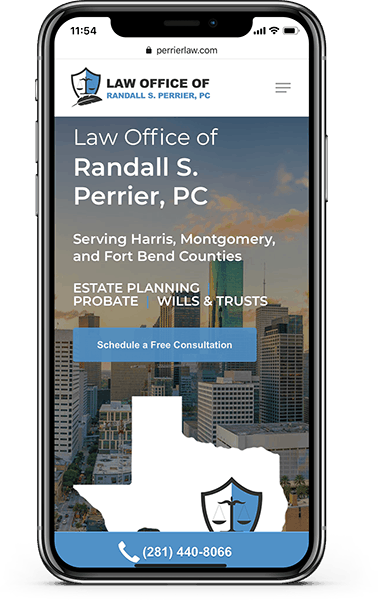
Domain Name Considerations
When choosing a URL for your website, there are two main considerations. If your firm or legal practice specializes in one type of law (family law, divorce, DUI, etc.), structure your site as follows:
Use a keyword targeted domain for your website URL.
- Example: https://familyattorneyidaho.com
Make certain that if you choose a keyword target URL that you are only going to target that practice area because this will cut down on your ability to rank for additional keywords. However, if you are only targeting one service area, keyword domains are the way to go.

If your law firm or legal practice offers multiple services (i.e. criminal law, corporate law, business law and more), this is how to structure your site:
Use a branded domain – NOT a keyword target domain.
- Example: https://perrierlaw.com
Using a keyword targeted URL will send mixed signals to Google. For example, https://familyattorneyidaho.com/our-serivces/criminal-defense/ crosses two practice areas. It’s best to use your law firm name as the root domain (URL).
Pillar 3:
Getting Found by Prospective Clients
Internet traffic is the lifeblood of any digital marketing strategy. You can be the most qualified, most experienced attorney in town, but if Google isn’t showing your website on page 1 to prospective clients when they are searching for answers to their legal problem, you’re losing out on a lot of business.

Getting Your Website Found with Search Engine Optimization (SEO)
Search engine optimization (SEO) for your law firm or legal practice involves strategies and techniques that help attract more prospective clients to your website by obtaining first page ranking positions in search engines such as Google, Bing, and Yahoo.
Having a comprehensive SEO marketing strategy is one of the best ways to get more leads and clients for your legal practice. This is because according to National Law Review, 96% of people seeking legal advice use a search engine, and 74% of people who visit a law firm’s website, do so to take action.
A successful SEO campaign can be a law firm’s largest source of new leads, while bringing in an excellent return on investment.
Keys Factors to a Successful Law Firm SEO Campaign
Focus on these five elements to increase your legal practice or law firm’s search engine rankings.
Target the Right Keywords for Your Law Firm’s SEO Campaign
Keyword research is all about determining which strategic keywords you should be targeting in your website’s content, and then how to create that content to satisfy both search engines and the people searching.
Keyword research will provide you with specific search data that can help you answer questions like:
- What specific terms are people searching for relating to your practice and geographic area(s)?
- How many people (per month) are searching for those terms?
As we mentioned in the content creation section above, You can use free tools like Ahrefs Keyword Generator to find keywords and content ideas that your prospective clients are searching for, along with Google’s “people also ask” section.
How to Choose Your SEO Keywords
Simply put, you’ll want to target the keywords that are going to have the most search volume, and result in the highest conversion rate possible for your legal practice or law firm. The best approach is to target both short and long-tail keywords throughout your website content.
On-Site Search Engine Optimization for Your Law Firm Website
On-Site SEO (also called technical SEO) is one of the main things that you can directly control in order to help your website rank higher. This include things like:
- Title tags– Search engines like Google use your title tag to understand what your page is about and then serves that content to its users. Make sure your title tag is less than 155 characters, unique to the page, and click worthy.
- Meta descriptions– Search engines show your website’s meta description in search results more frequently when the searched-for phrase is within the description, so optimizing the meta description is a simple and import thing that can be done to improve your SEO.
- Image alt tags– Applying alt tags to images can positively impact a law firm’s search engine rankings, especially for local (Google Maps) SEO.
- Schema– This is specific “markup” (code) that helps the search engines return more informative results for users directly within search engine results pages (SERPS).
The ultimate goal of on-site SEO is to leverage the factors Google uses to judge the quality of each of your web pages. You can then create content that uses these factors to enhance the experience of your prospective clients to increase conversions (contact form submissions and phone calls).
On-Site SEO Audit
If your site isn’t where you want it to be and you’re not seeing the traffic or search rankings that your competitors have, you need to run an SEO website audit. An SEO audit checks for site errors, meta descriptions and title tags and helps you uncover what needs to be fixed or changed on your web pages to boost your search engine visibility.
SEO Backlink Building Outreach
A backlink is a hyperlink from someone else’s website to your website. Earning backlinks to your law firm’s website is one of the best ways to increase your search engine rankings. It’s important to know that you should only ever build natural, high quality backlinks, and although the volume of backlinks you have will impact your rankings, it is better to concentrate on quality over quantity.
Your SEO campaign should concentrate heavily on increasing the volume of relevant backlinks your website has. These can include partner’s or vendor’s websites, legal blogs, legal forums, legal directories and more.
Achieve Top Search Engine Rankings with the Right Content Marketing Strategy
Effective, quality content marketing is paramount for top search engine rankings. The content on your website has a direct effect on your website’s ability to rank on Google and on your ability to convert website visitors into clients. Google has come right out and stated that “content” is among its top three ranking factors.
If you follow the steps in Pillar 1 of this guide “Supporting Your Brand with Compelling, Useful and Quality Content” then you’ll already have this part covered.
SEO Content Fundamentals
Always create content for your potential clients first. Never put content on your website simply because you think your website needs more content. Everything on your website should serve a specific purpose for your prospect. It should address and answer frequently asked questions and help illustrate why you are the best choice to do business with.
Google Maps Listing Optimization
Google Business listings (Google Maps) are featured prominently on mobile devices for users seeking local products and services. As a result, Google Business SEO can create incredible exposure for attorneys and law firms.
Primary factors that influence Google Maps rankings:
- Whether or not your law firm is verified on Google Business.
- The volume and accuracy of “citations” to your law firm (mentions of the firm name, address, and phone number on other web listings, such as Yelp, Facebook, Yellowpages, LinkedIn, etc.).
- The total number and average rating of reviews on your Google Business listing.
- The proximity in which your law firm is located to the searcher.
- The domain authority of your law firm’s website (having to do with the quantity and quality of your backlinks).
Importance of Google Maps for Local SEO
With mobile Internet use dramatically increasing, the relevancy for Google Maps marketing is on the rise for a majority of legal practices and law firms.
- Today’s digital environment revolves around mobile use, with 90% of Internet users owning a smartphone.
- Over half of Google searches done on a mobile device are done so with the intent of looking for a local business, service, product, or information.
- Google search continues to focus on local searchers seeking products and services in their area. Beyond marketing, Google Maps displays general brand and business information such as hours of operation, physical location, customer reviews, and driving directions.
To learn more about how you can outrank your competitors and dominate your local market with SEO, check out our post on law firm SEO. It goes into more detail about the 5 key elements for getting lawyers and law firms top rankings in search engines like Google and Bing.

SEO can be labor intensive and time consuming, therefore it’s not a bad idea to consider outsourcing the project to a competent Law Firm SEO company. Search engine optimization should be an ongoing process that you have a plan to keep doing for as long as you want to stay high up in Google’s search results.
That said, having a basic understanding of how a successful SEO campaign works is important. Any SEO campaign done for you should include all of the elements listed above. Furthermore, the price of SEO services varies widely. It’s absolutely a good idea to talk with multiple companies and compare their price and the tasks they’re actually performing for you.
Getting Your Website Found with Pay-Per-Click Ads (PPC)

Pay-per-click marketing platforms like Google Ads are a great way for law firms to quickly start driving prospective clients to their website. When done correctly, PPC advertising for attorneys can become a major asset in the effort to grow for your legal practice or law firm.
Pay-per-click ads are extremely effective for law firms because they identify people at the exact moment they are searching for legal help and show them a relevant ad, phone number, and link to your website.
But, with legal keywords costing anywhere from $10 to $100+ per click, it’s extremely important that your campaign is setup correctly in order for it to be successful. If you bid on the wrong keywords, or direct paid traffic to a bad website (one with an unprofessional appearance and thin content), it won’t work.
For example, if you’re a personal injury lawyer marketing your firm, you could be looking at costs per click of $50+ (depending on your geographic service area). To compete, it’s imperative that your website be set up to convert prospective clients before you ever spend a dime on PPC ads.
Your website must be setup to convert prospects into clients before you start paying to send traffic to it. If it’s not, you’re simply lighting those marketing dollars on fire.
Setting Up Your PPC Campaign for Success
If you’ve tried PPC marketing and haven’t had the results you’d hoped for in the past, it’s likely due to one or more of these reasons:
- Targeting the wrong keywords (or using the incorrect match type). A “broad” match keyword for example can show ads for the wrong practice type. And truth be told, you should never target a keyword as broad as “attorney.”
- Your website isn’t setup correctly to convert prospects into clients.
- Your campaigns are not optimized correctly (this includes ad copy, ad extensions, and landing pages).
So, how do you execute a PPC campaign that attracts your ideal leads while maintaining a healthy ROI?
Target the Right Keywords
It’s vital you ensure your target keywords speak to the search’s intent and readiness to hire an attorney in your specific legal practice area. You don’t want to target keywords as broad as “attorney” or “law firm.” These keywords can cost as much as $50 per click and will convert at a very low rate.
Make certain that you are only paying for your ad to show up for extremely specific keywords related to your practice area(s) (i.e. “estate planning attorney Houston”). Paying for traffic from keywords that are too broad is the fastest way to waste your PPC budget with no results to show for it.
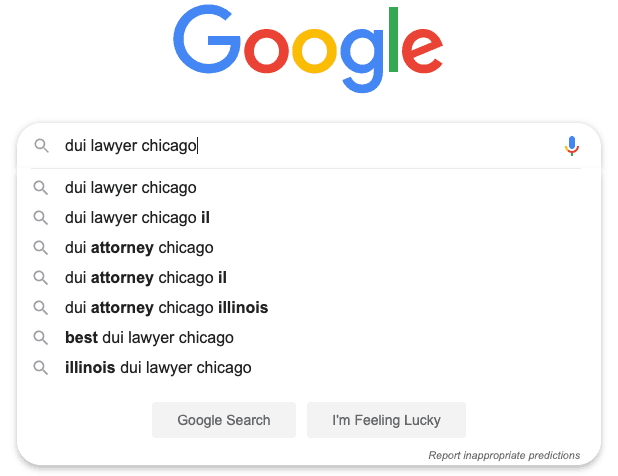

Refine your traffic with negative keywords. Negative keywords are terms that you don’t want your ad to show up for. For attorneys and law firms it’s important to include negative keywords such as “jobs” and “salary” to prevent your ad from being clicked by employment seekers. There are many other negative keywords you may want to include as well, such as local competitors and specific keywords pertaining to cases that are not ideal for your firm.
Target the Right Geographic Area
Targeting too broad of an area is another way to quickly spend ad budget without a return. Take the time to look into your target market and know what areas they would be searching from. If you have multiple locations, separate these into their own campaigns so you can target each accurately and individually. You can target your ads at zip codes, cities, and even a radius around a specific address (such as your office).
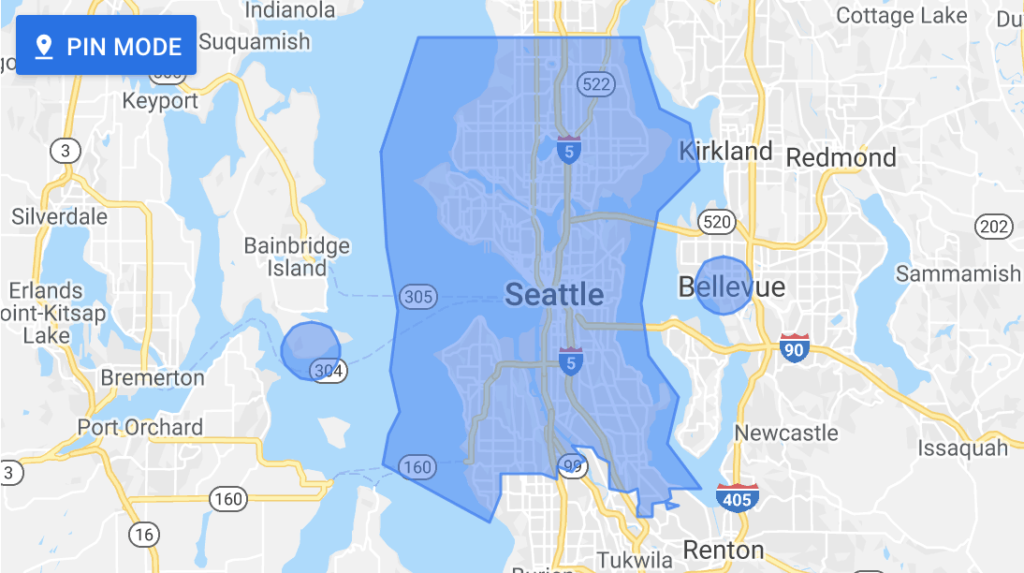
Use Keyword Targeted Landing Pages
It’s also importance to direct certain keywords to targeted landing pages. For example, if you practice criminal defense law and somebody clicks on one of your DUI ads, make sure that ad takes them to your DUI page and not your homepage.
The more specific you can make your whole sales process using Google Ads, the better your results will be. Remember, prospective clients go through a progression of searching keywords. They scan results, clicking on a compelling one, and land on a page. They then either read and call you, or click the back button depending on how relevant your page is.

Tracking conversions is the single most important thing you can do to ensure your PPC campaign is successful.
It’s not enough to simply measure success by how many people click your ad. An ad might be getting clicked a lot, but if those clicks don’t result in an acceptable conversion rate then that keyword needs to be eliminated from your campaign.
You need to know things like how long prospects are on your website, how many pages they visit, and ultimately if they called or filled out a contact form.
At a minimum, your campaigns should be setup to track all contact form submissions and phone calls. You can track conversions using the call tracking tools offered by Google Ads, Google Analytics, and third-party call tracking such as CallRail.
![]()
Getting Your Law Firm Found with Google Local Service Ads
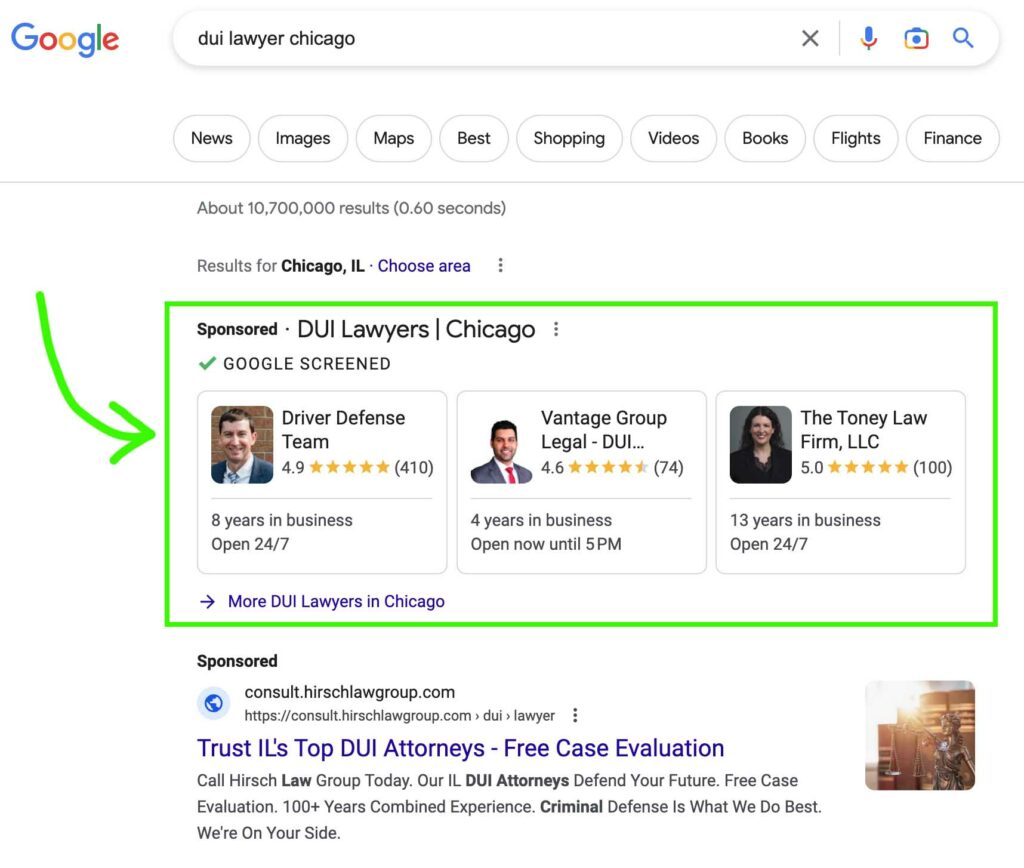
Google Local Service Ads are a type of pay-per-lead advertising offered by Google, designed to help local service providers (including lawyers) connect with potential clients in their geographic service area. These ads appear at the top of Google search results and prominently display your law firm’s name, phone number, reviews, and a “Google Guaranteed” or “Google Screened” badge where applicable.
Google Local Service Ads for lawyers target users who are searching on Google for legal services in your area, increasing the likelihood of attracting relevant leads. When a user clicks on your ad, they can either call your legal practice directly or visit your LSA profile for more information. You only pay when a potential client contacts you through the ad, making local service ads a cost-effective marketing option.
Google Local Service Ads offer a many advantages for attorneys looking to advertise their legal services. One of the most notable benefits is the instant increase in online visibility. By utilizing the Google LSA platform, attorneys can now potentially be listed on the first page of Google up to four times. These placements can include the Local Service Ads (LSA) position, standard Pay-Per-Click (PPC) position, Google Maps (also known as the “3 pack”), and the standard organic search results.
Another significant advantage of LSAs is their potential for an excellent return on investment. Unlike traditional PPC models used by Google Ads, LSAs operate on a pay-per-lead basis. This model ensures that attorneys only pay for leads directly resulting from the LSA. These leads tend to be highly convertible and action-oriented, further maximizing the return on the ad spend. Additionally, Google provides the option to dispute any charges for leads that are not deemed relevant, further enhancing the profitability of the LSA campaign.
Lastly, Local Service Ads can foster enhanced trust through the use of “Google Guaranteed” or “Google Screened” badges. These badges can instill confidence in potential clients, thereby increasing the number of new client calls generated by the ads.
Google Local Service Ads offer attorneys a powerful, cost-effective way to attract new clients and grow their legal practice.
Pillar 4:
Track Conversions and Increase Client Acquisition with Conversion Rate Optimization (CRO)

Having a website and getting more traffic is only valuable if it leads to an increase in paying clients.
Conversion rate optimization (CRO) is a combination of your branding, content, website, customer reviews, and calls to action (click to call buttons, contact forms, etc.). This is where it becomes important to review all the previous parts of this guide, and ensure they are working together.
At the end of the day, a law firm digital marketing campaign should be designed to do one thing… get you more clients.
If you follow the key elements in Pillars 1-3 of this guide, you’ll already have the vast majority of your CRO completed. From there it’s simply a matter of A/B testing things like images, ad copy, and offers.
Keys to Increasing Your Conversion Rates
Display Online Reviews on Your Website
Social proof is one of the most powerful and fastest ways to increase your conversion rates. What we find is that many prospective clients find a new lawyer or law firm by searching a practice specific keyword first (i.e. “bankruptcy attorney Seattle”). They then go back to google and search for that lawyer or law firm specifically and include the keyword “reviews.”
Preempting their search by showing them all of your best reviews on your website first can increase your conversions significantly.
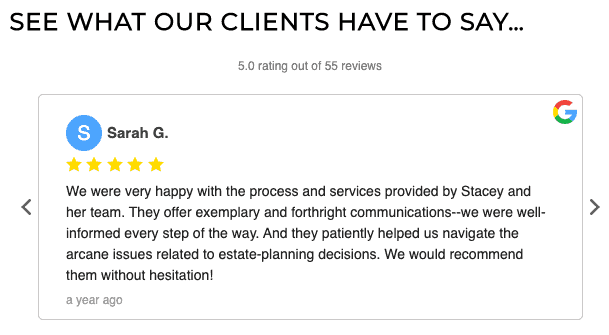
Create Keyword Targeted Content Pages
The content on these pages should be optimized for specific keywords such as “DUI laws in Oregon” (whatever the Google Ads phrase or SEO keyword you’re targeting). They should be unique for each specific service you are practicing and promoting.
The content on these pages should specifically address (in detail) the search phrase a prospective client used to arrive at the page. Going the extra mile to create a valuable, free resource for your prospective clients is one of the best ways to set yourself apart from your competitors.

Make Sure a Person is Answering Your Phone
It’s amazing how few attorneys and law firms actually answer their phones. If a potential client calls and can’t reach you right away, they’re moving on to the next listing on Google. Don’t spend time, money and energy getting more traffic to your site if you don’t have a good system in place to have a real person answer every phone call (at a minimum during regular business hours). Also, minimize the use of automated call answering systems that require a person to press multiple buttons before being connected to a real person. People are impatient, and these systems can reduce conversion rates significantly.

Track Conversions
This is the single most important step to running a successful law firm marketing campaign, and the one we most often see overlooked. You will never know how successful your marketing dollars are, or how to optimize your campaigns for more success unless you track conversions.
Again, you can track conversions using the free call and form tracking tools offered by Google Ads, Google Analytics, and paid third-party tools such as CallRail.
![]()
Conclusion
There is still a ton of opportunity for attorneys and law firms to grow their legal practice with digital marketing in 2024, and it doesn’t have to be painstaking or expensive. If you simply follow the fundamentals in this guide, you’ll be well ahead of the vast majority of other law firms.
We hope you’ve found this guide helpful, but also empowering. You can absolutely still win online, the gold rush has only just begun. Take action today to start leveraging the power of digital marketing for your law firm and start getting more of the clients you want!

About the Author
Chris is a legal marketing consultant who has been helping attorneys and law firms grow their revenue and scale their legal practices for the past 13 years. His areas of expertise are in content marketing, search engine optimization (SEO), pay-per-click (PPC), digital PR & branding, and conversion rate optimization (CRO).
Latest Law Firm Marketing Tips


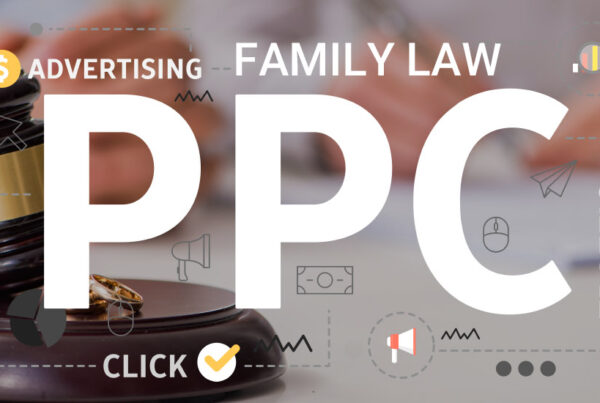
Have a Question About Something You Read in This Guide?
Schedule a FREE Strategy Session
What your strategy session will be focused on:
- In-Depth Digital Presence Analysis: Discover how your current online footprint measures up and how to enhance it.
- Competitor Analysis: Uncover what your competitors are doing and how to outperform them.
- Branding & Conversions Analysis: Understand how to not just attract traffic, but convert it into paying clients.
- Expert Second Opinion: Get a fresh perspective on your current marketing strategies and their effectiveness.
- Comprehensive Q&A: Receive personalized answers to your questions, offering clarity and strategic direction for your law firm’s digital marketing efforts.



